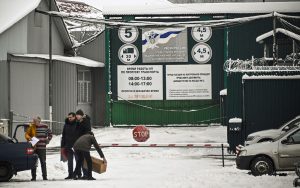
Cherelle Griner, the wife of Phoenix Mercury center Brittney Griner, smiles as she talks to President Joe Biden following the WNBA standout’s release. (Photo courtesy of the White House)
PHOENIX – As many celebrated the news of Brittney Griner’s release Thursday, others addressed the conditions of Russian penal colonies, raising questions about the lingering impact that could have on the WNBA star.
The Phoenix Mercury center, who had been detained in Russia since February, was released in a prisoner swap that included Russian arms dealer Viktor Bout. She was serving a nine-year sentence after arriving in the country carrying a small amount of hash oil.
“She’s safe, she’s on a plane, she’s on her way home,” President Joe Biden said at a White House press conference.
In November, Griner was moved from a detention facility to a penal colony in the Russian region of Mordovia to serve her sentence on drug smuggling and possession charges.
“IK-2, where Brittney Griner was sent, is known as one of the harshest correctional facilities in the Russian Federation,” said Tyler Kirk, an assistant professor of history at the University of Alaska Fairbanks. “It’s the location conditions there, the guards that work there, but also just the horrible conditions and human rights abuses.”
Griner was sent to the penal colony without her lawyers and the U.S. government knowing where she was headed until her arrival.
“I think what the world is realizing is that the Russian penal system hasn’t changed much since the Soviet period,” said Laura Piacentini, a criminology professor at the University of Strathclyde in Glasgow, Scotland, who has conducted research on post-USSR jails. “Former prisoners and prisoners serving all talk about how inhumane and degrading the prisons are. Nobody talks about feeling rehabilitated. There is a collective punishment experience.”

The penal colony IK-2 in central Russia, where Brittney Griner was sent, is known for its remote location and harsh conditions. (Photo by Alexander Nemenov/AFP via Getty Images)
The colony is several hundred miles from Moscow and can hold approximately 800 female inmates, according to the Russian prisons’ service website.
In a 2021 interview with the New York Times, Russian opposition leader Aleksei A. Navalny described, during his imprisonment, his experience at a penal colony as perpetual scrutiny.
“You need to imagine something like a Chinese labor camp, where everybody marches in a line and where video cameras are hung everywhere,” he said. “There is constant control and a culture of snitching.”
He also described “sleep deprivation torture” and said guards frequently woke him up every hour during the night.
Griner’s detainment lasted 294 days. She had just arrived in Russia to play basketball during the WNBA offseason. For some WNBA players, it can be a challenge to go overseas to continue playing the sport, but many do because of the significantly higher salaries.
“You have to have a strong mental capacity just to play overseas and be apart from your family to play the game you love,” former WNBA player and Mercury assistant coach Chasity Melvin said. “You have to be mentally tough just to be apart from your family and integrate yourself in another culture.”
As Griner returns to the United States, she will be going to San Antonio to reunite with her family and seek medical care. Griner’s wife, Cherelle Griner, expressed her gratitude to the media at the White House.
“Today my family is whole.”
